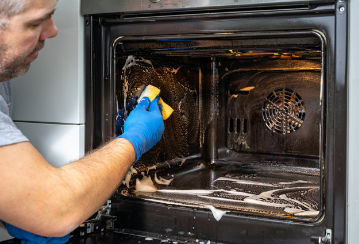News and Updates
4 ways to prevent a house fire
Fire-related home insurance claims are on the rise! Statistics show that residential fires related to cooking or smoking increased by 333% between March and May 2020.1 Keep yourself, your family and your home safe this summer by reviewing these common causes of home fires and prevention tips.
1. Check your safety equipment
Maintaining your smoke alarm system is a simple way to minimize risk. Check all smoke alarms monthly. For a more detailed explanation on smoke alarm maintenance, review these tips from the Ontario Association of Fire Chiefs.
If you have a fire extinguisher in your home, ensure that it is always refilled after every use. Fire protection experts recommend that you have three extinguishers – one for the kitchen, one for the basement and one for the garage.2 A multi-purpose dry chemical extinguisher labelled ABC puts out most types of fires, including wood, paper, cloth, flammable liquid and electrical fires.
2. Beware of flammable soil and mulch
Are you an avid gardener? Potting soil can be highly flammable under dry conditions.3 Water your plants regularly to maintain optimal moisture levels — and to help keep them alive! Also consider using clay pots for your potted plants, as they tend to contain fires more effectively. You should store unused soil away from combustible materials like old newspapers and cleaning products. For the exterior of your home, mulch can also be very flammable. To prevent a fire from starting, avoid spreading the mulch in large clumps and water it along with your plants.
3. Be proactive with home maintenance
Often, house fires are started by little sparks that could have been prevented. Be proactive and ask yourself, “Could a fire start from this situation?”
 Here are a few ways you can be proactive with your home maintenance and prevent fires:
Here are a few ways you can be proactive with your home maintenance and prevent fires:
-
Clean excess grease from ovens.
-
Replace damaged and frayed electrical cords and avoid overloading circuits by plugging too many items into the same outlet.4
-
Keep in mind that symptoms of potential wiring problems include household lights that dim or flicker, a TV picture that shrinks in size, frequent blown fuses, or circuit breakers that trip frequently.4
-
Make sure power strips and surge suppressors are designed to handle the loads you will be using them for.4
-
Ensure you have working flashlights handy to use during blackouts instead of candles and always avoid carrying lit candles whenever possible.
-
Do not operate a clothes dryer without a lint filter and clean lint filters before or after each use and remove any lint from around the dryer drum.
-
If a fire does break out, you can still be proactive by having a rehearsed evacuation plan and a fire extinguisher ready (for a small fire only).2
4. Practice safe cooking habits
Perhaps you’re cooking at home more often and getting in tune with your inner chef. Safe cooking starts even before the oven or barbecue are turned on.
Try to practice these safe cooking habits:
-
Avoid wearing baggy clothes and roll up your sleeves to avoid getting them caught on burners or catching fire.5
-
When cooking, stay focused on the task at hand. If you wander away from a hot stove, there’s a chance you may return to a pot boiling over or a grease-spitting pan.5
-
If you are faced with a small fire that is contained in a pan, put on an oven mitt and smother the flames by carefully sliding the lid over the pan. For oven or microwave fires, turn off the heat and keep the oven door closed to prevent the fire from spreading. Make sure you let others in the household know, evacuate and call the fire department.
-
Another hazard is the dreaded hot handle of a pot or pan. Avoid burning yourself or others by keeping your children's hands a safe distance away and always using oven mitts.5
-
Routinely check your barbecue. With gas grills, be sure that the hose connection is tight and check hoses carefully for leaks. Applying soapy water to the hoses will easily and safely reveal any leaks. In case an accident does occur, ensure you have the right home insurance coverage to protect your home and belongings.
If you have questions about your current OTIP home insurance policy, call 1-800-267-6847. If you would like to get a quote for home insurance, connect with an OTIP broker today at 1-866-561-5559.
1. CTV News – Experts say kitchen fires in Canada increased during COVID-19 pandemic
2. Canada Safety Council – Are you and your family prepared?
3. NBC 6 News – Potting soil can be a fire hazard
4. Government of Canada – Fire safety in your home
5. Ontario Association of Fire Chiefs – Cooking safety







